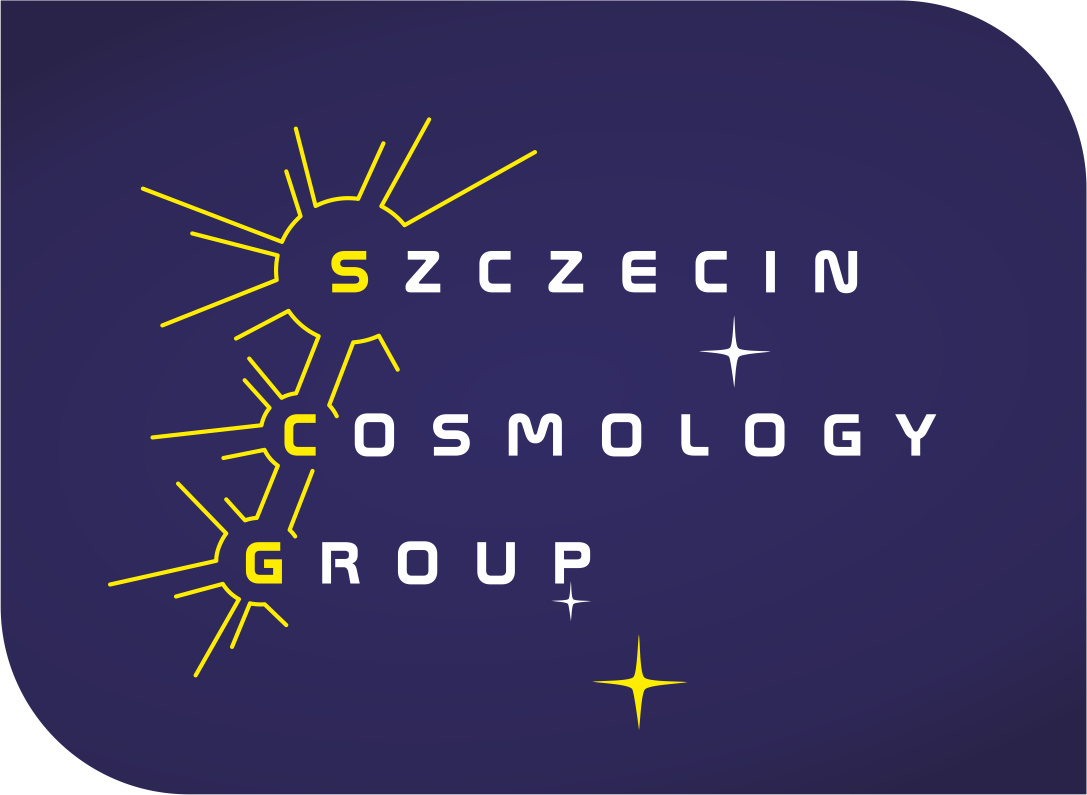DESY, Platanenalle 6, 15738 Zeuthen n. Berlin, Germany, 18.05.2018
(Konferencja wyłącznie w języku angielskim)
Organizers:
Ana Alonso-Serrano (MPI Golm, Germany), Mariusz P. Dąbrowski (chair, Univ. Szczecin, Poland), Thomas Naumann (DESY Zeuthen, Germany)
An idea of the meeting is to unite the groups working on cosmology from University of Szczecin, Albert Einstein MPI Golm, and DESY Zeuthen. This is one-day meeting. The idea is to have more informal talks appended with the extensive discussions. People interested in joining may contact the chair organiser (Mariusz.Dabrowski@usz.edu.pl) about the attendance.
Participants:
1. Ana Alonso-Serrano (MPI, Golm)
2. Mariusz P. Dąbrowski (USzczecin)
3. Hussain Gohar (USzczecin)
4. Jean-Luc Lehners (MPI, Golm)
5. Thomas Naumann (DESY, Zeuthen)
7. Tomasz Denkiewicz (USzczecin)
8. Marek Kowalski (DESY, Zeuthen)
9. Albin Nilsson (NCBJ, Warsaw)
10. Giovanni Acquaviva (CharlesU, Prague)
11. Daniele Oriti (MPI, Golm)
12. Stephen Green (MPI, Golm) – TBC
Programme:
Friday, 18.05.2018
9.00 – 9.30: Registration at DESY, Platanenallee 6, 15738 Zeuthen, Room 1, 3rd floor, building H
9.30 – 10.00: A. Alonso-Serrano ” Black hole information flux”
10.00 – 10.30: G. Aquaviva „Emergent scenario from the Bekenstein bound: some implications”
10.30 – 11.00: M. Dąbrowski „Cosmological measurement of the speed of light”
11.00 – 11.30: Discussion
11.30 – 12.30: Lunch
12.30 – 13.00: Jean-Luc Lehners „Gravitational path integrals and the early universe”
13.00 – 13.30: K. Leszczyńska „Varying constants driven baryogenesis”
13.30 – 14.00: D. Oriti „Possible resolutions of the cosmological singularity in quantum gravity”
14.00 – 14.30: Discussion
14.30 – 15.00: Coffee
16.00 – 16.30: A. Nilsson „Probing Horava-Lifshitz cosmology”
16.30 – 17.00: TBA
17.00 – 17.30: TBA
17.30 – 18.00: Discussion
18.00 – 19.00: Dinner
19.00: Farewell
Talk titles with abstracts:
Daniele Oriti
Title: Possible resolutions of the cosmological singularity in quantum gravity
Abstract: We illustrate the general ideas and recent results in group field theory condensate cosmology, a framework in which cosmological dynamics emerges as the hydrodynamics of the microscopic quantum gravity degrees of freedom. We then focus on the fate of the classical cosmological singularity, in this context, and discuss two ways in which it may be resolved. We also discuss some conceptual and physical issues associated with this resolution and with the whole framework.
Ana Alonso-Serrano:
Title: Black holes information flux
Abstract: We have studied the entropy budget per particle emitted in black hole evaporation process. In order to carry out this calculation we
adopted a variant of the “average subsystem” approach, but consider a tripartite pure system that includes the influence of the rest of
the universe. If the process is unitary, the entropy is exactly compensated by the “hidden information” in the correlations that we
choose not to consider within the specific selected coarse-graining. In addition, the entropy budget should be corrected at the last
stages of evaporation, due to quantum gravity effects. We have been shown recently how these effects (expressed in terms of the
generalized uncertainty principle) modify the Hawking flux when we approach the Planck size.
Giovanni Acquaviva
Title: Emergent scenario from the Bekenstein bound: some implications.
Abstract: The Bekenstein bound states that the entropy of a system contained in a certain volume is bounded from above by the entropy of a black hole with corresponding surface area. We relate such universal bound to the existence of fundamental degrees of freedom and provide model-independent considerations about their features. In particular, both geometry and fields propagating on it are seen as phenomena emergent from the more fundamental dynamics, in analogy with many examples in condensed matter physics. An immediate consequence is that, even though the fundamental evolution is considered unitary, the fields develop an entanglement with the spacetime geometry, hence leading to an effective non-unitary evolution on the emergent level. We exemplify some consequences of this scenario by providing a toy-model of black hole evaporation, in which the entanglement between geometry and fields is interpreted at our low-energy scales as an effective loss of information in Hawking r adiation.

